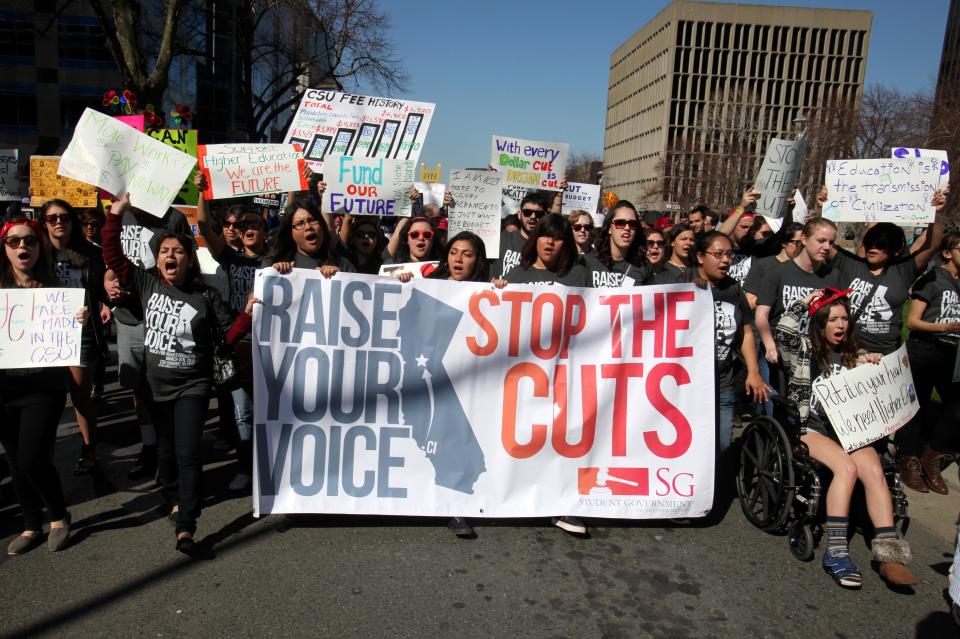States are cutting university budgets. Taxpayers aren't interested in funding campus kooks
Times are bad for higher education, and higher educators are beginning to notice it. But the industry’s problems are mostly of its own making.
The latest "cri de coeur" comes from University of North Dakota’s Sheila Liming, who writes, “My University is Dying; And soon yours will be, too.”
She notes: “Starting in 2016, our state university system endured three successive rounds of annual budget cuts, with average 10-percent reductions resulting in a loss of more than a third of the system’s overall funding. Additional cuts, even, were on the table this past year. And while our state legislators ultimately avoided taking yet one more stab at the dismembered body of higher education, there has been no discussion of restoring any of those funds.”
And it’s not just North Dakota: “The experience of living with the metastasizing effects of austerity grants me some insight into what has been going on in Alaska. In July, Alaska Gov. Mike Dunleavy announced a plan to strip the University of Alaska system of 41 percent of its operating budget. He has since tempered this plan, opting instead for a 20-percent cut to be meted out over a period of three years.” Why are these cuts actually occurring?
There are lots of cuts in lots of places, and while some of them can be blamed on state budgets, that’s not really what’s going on. We’re in an economic boom — North Dakota is even a center of fracking — and states are still spending plenty. The ultimate reason for the cuts is that taxpayers in many states no longer think higher education is worth the money.
Faculty members, and the administrators who are the real power in universities nowadays, dismiss this as ignorant anti-intellectualism. But is it?
A campus divided: 'Tolerant' educators exile Trump voters from campus: Glenn Reynolds
Whom the gods would destroy, they first make crazy. And higher education has become objectively crazy. It’s not a shock that taxpayers think their money might be better spent elsewhere than on subsidizing enclaves of insanity. It’s especially true when universities spend so much of their time attacking so many of the Americans who pay taxes to support them, from Trump voters, to Christians, to gun owners and businesspeople. It takes a lot of chutzpah to slap someone in the face and then put your hand out for money, but that’s what universities have been doing for decades and with special force over the past few years.

One example occurred recently at The University of Maine. Maine has chosen to rename Columbus Day “Indigenous People’s Day.” This drew objection from the mayor of Waterville, Nick Isgro, and the University of Maine College Republicans put up a Facebook post in support, reminding people that some of the indigenous peoples Columbus and his successors conquered practiced cannibalism and ritual sacrifice.
This statement was, of course, true, but that didn’t matter. It drew a harsh response from UMaine President Joan Ferrini-Mundy and Dean of Students and Vice President for Student Life Robert Dana, in the form of a mass email to all students, shaming the College Republicans for daring to take a pro-Columbus position. They stated: "The positions reflected and reposted on that [Facebook] page are neither supported by nor reflective of the University of Maine's values and principles of inclusivity and equity.”
Continued campus fodder for taxpayer disgust
Taxpayers may wonder what, exactly, about a truthful historical statement is beyond the bounds of university life, and why unelected educational bureaucrats get to decide what the university’s values are. But more likely they will simply conclude that universities are silly places, not worthy of their tax dollars.
Nor is what happened at Maine an isolated example. Websites like Campus Reform, The College Fix, and Minding The Campus provide a steady diet of similar — or worse — behavior at schools across the nation. And, of course, after the 2016 election, we were treated to such absurdities as the University of Michigan Law School offering Play-Doh, coloring sheets, and Legos for students in need of comfort after the election, while Stanford University reminded people that psychological counseling was available for those suffering “uncertainty, anger, anxiety and/or fear” from Hillary Clinton’s defeat. At Cornell they had a “cry in.” At Yale, they had a “group scream.”
White professor: My university investigated me for quoting James Baldwin's use of 'N-word'
Years ago, in "The Higher Education Bubble," I warned that universities were going to be squeezed by online competition, changing job markets and fears of excessive student loan debt. To survive, I said, they’d have to be leaner and more focused on what people actually want from universities, instead of the things that were popular mostly with university administrators. These warnings were largely unheeded.
So am I blaming the victims for these budget cuts? Basically, yes, with the proviso that the victims are also perpetrators. For decades, higher education has, often quite consciously and openly, set itself against the larger society in which it is embedded while still expecting support, much like a rebellious adolescent who still expects parents to cover the cellphone bill. Now much of the larger society is having second thoughts, and universities will have to decide whether they want to change or shrink. Sadly, I’m beginning to doubt that they’re smart enough to change.
Glenn Harlan Reynolds, a University of Tennessee law professor and the author of "The New School: How the Information Age Will Save American Education from Itself," is a member of USA TODAY's Board of Contributors.
You can read diverse opinions from our Board of Contributors and other writers on the Opinion front page, on Twitter @usatodayopinion and in our daily Opinion newsletter. To respond to a column, submit a comment to letters@usatoday.com.
This article originally appeared on USA TODAY: Taxpayers are fed up: The real reason universities are making cuts

